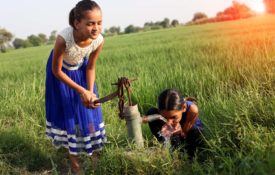-

Water-Scarce Cultures Value Long-Term Thinking More Than Their Water-Rich Neighbors Do
Even in modern environments with easy access to water, cultural responses shaped by historical water scarcity still influence individuals’ decision-making processes.
-

New Content From Current Directions in Psychological Science
A sample of articles on parental burnout, motivated egalitarianism, the philosophy of perception in the psychologist’s laboratory, facing the unknowns in data analysis, and much more.
-
Study Examines What Aspects of Mental Health Are Tied to Doing Well in Math, English
MICHEL MARTIN, HOST: One ongoing question in child psychology is what can help kids do better in school? For a long time, researchers have focused on happiness. The thinking goes, when kids feel happier, they tend to get better grades. But now a new study suggests that parents and schools should focus on another aspect of mental health. NPR's Michaeleen Doucleff has this report. MICHAELEEN DOUCLEFF, BYLINE: Two years ago, Tania Clarke and her colleagues sent out a survey to teenagers asking about their well-being. She's a psychologist at the University of Cambridge. TANIA CLARKE: Our study was conducted with just over 600 adolescents aged 14 to 15 across seven schools in England.
-
Tap Into the Wisdom of Your ‘Inner Crowd’
Take your best guess for the questions below. Without looking up the answers, jot down your guess in your notes app or on a piece of paper. What is the weight of the Liberty Bell? Saudi Arabia consumes what percentage of the oil it produces? What percent of the world’s population lives in China, India, and the European Union combined? Next, we want you to take a second guess at these questions. But here’s the catch, this time try answering from the perspective a friend whom you often disagree with. (For us, it’s the colleague with whom we shared an office in grad school, ever the contrarian.) How would your friend answer these questions?
-
How Culture Affects the ‘Marshmallow Test’
In 2017 my family and I moved from Boulder, Colo., to live in Kyoto, Japan. My kids immediately noticed many cultural differences. Japanese homes typically do not have central heating, for one. We arrived during an unusually cold February, so my older child would curl up under the kotatsu—a low dining table with a heater affixed underneath—to get warm. After enrolling in the neighborhood elementary school, my kids saw how their peers cleaned classrooms and served food, unlike in the U.S., where specialized workers handle each task. One of their most memorable lessons occurred during their first school lunch.
-

New Research From Clinical Psychological Science
A sample of research on mapping psychosis risk states, increases in depressive symptoms during antidepressant discontinuation, race-based rejection sensitivity, the longitudinal association between PTSD, emotion dysregulation, and postmigration stressors among refugees, and much more.

